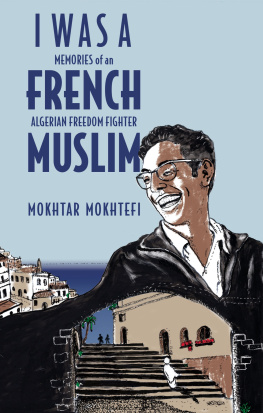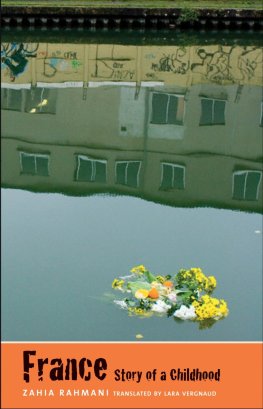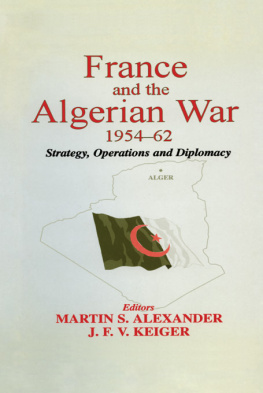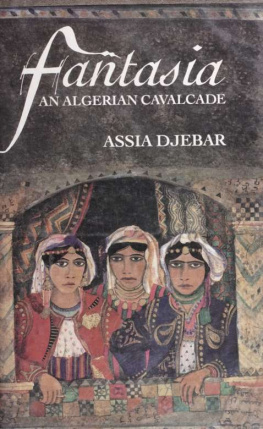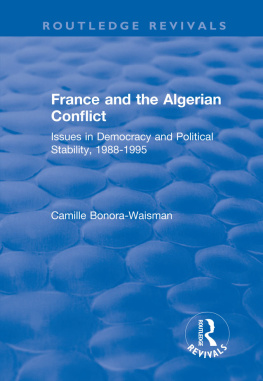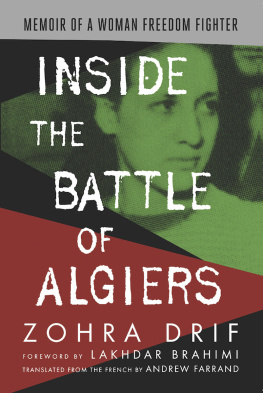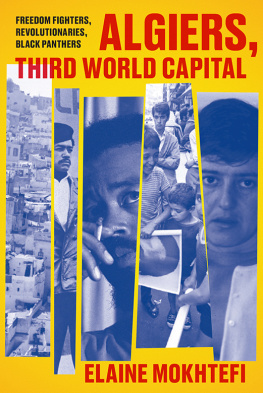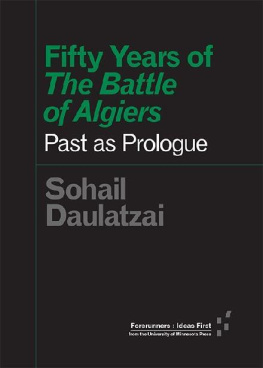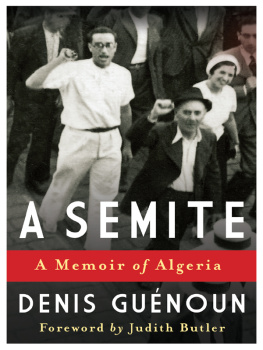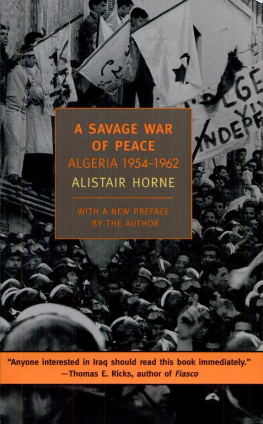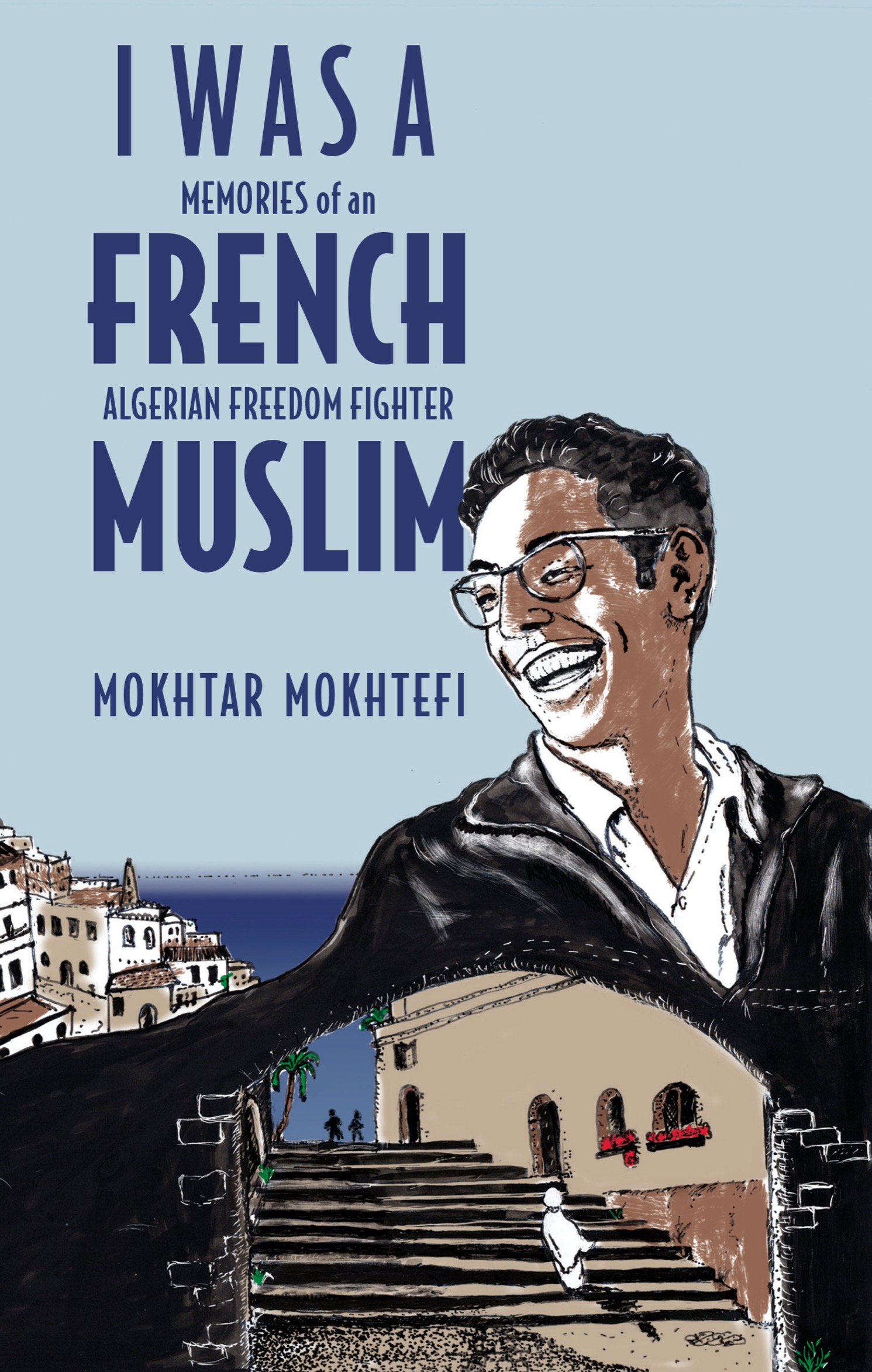Contents
Landmarks
Print Page List
Praise for
I Was a French Muslim
Mokhtefi was able to reconstruct the sights and sounds of life in his village of Berrouaghia and the constant pressure he felt to be [a French Muslim]moving.
ALICE KAPLAN, The Nation
Mokhtefis witty commentary illuminates his buoyancy even in the midst of destruction and heartbreakHis story is a page-turnerhis colorful portrayal of the character of time, place, and people in colonial, wartime Algeria provides captivating reading, as well as context for the relations between France and Algeria then and now.
Markaz Review
Mokhtar Mokhtefis autobiography holds an original position in the panorama of increasingly abundant memoirs of veterans of the war fought by the Algerian Front de Libration Nationale (FLN) against France between 1954 and 1962. For freedom of tone, irreverence, assumed subjectivity, as well as for the elegance of a swift and precise style, the work avoids any eagerness of edifying narrative or systematic theories; what emerges is, in contrast, almost a social history of Algeria during the colonial era.
ANDREA BRAZZODURO, Marie Sklodowska-Curie Global Fellow, Ca Foscari University of Venice and University of Oxford
Mokhtar Mokhtefi and I met and became friends in the last year of his life. We spent hours discussing the manuscript of his memoir; it was his reason for being. He had two essential objectives: one was to remind todays youth that under colonialism one was never a citizen but a French Muslim, a subhuman being, treated as such. His second goal was to display how independent Algeria, as other former colonies, became the continuation of colonization, in the form of dictatorship. The colonialists departed but would be replaced by Algerians who in effect colonized fellow Algerians, and it is not over.
AMARA LAKHOUS, author of Clash of Civilizations Over an Elevator in Piazza Vittorio
A gifted storyteller, Mokhtefi communicates an infectious love of country, yet he firmly dispenses with the pieties of official nationalism by depicting infighting, internal purges, and political ambitions within the nationalist ranks. I Was a French Muslim has been brilliantly translated from the French by the person closest to the author his widow, Elaine Klein Mokhtefi, in her own right a talented writer and veteran of the Algerian Revolution.
MADELEINE DOBIE, Professor of French and Comparative Literature, Columbia University
When I read Mokhtar Mokhtefis memoir, I had the feeling I was discovering my Algerian heritage. It represented the promise of belonging. It made me see how little I had understood colonialism, the war, the people, their resilience, and their humor. It has been a breathtaking adventure. Through him, I have felt the fear of persecution, the incommensurate anger against colonialism, the salty smell of the streets of Algiers, the electrifying atmosphere of independence, the dreams of a boy and soldier who became a free spirit, and the sounds of laughter and rapture. I Was a French Muslim is the gateway to a world so distant today, a world pregnant with promise and fury, of life and joy, of dignity, passion, and utopia. May his words resonate in our hearts and our lives.
KARIM ANOUZ, Brazilian film auteur and director
Mokhtar Mokhtefi recounts in the first person an intimate page of history that marked him for lifeI Was a French Muslim tells the story of the battle, not only against colonialism, but above all, for liberation. The personal and the political come together to trace the ideal of emancipation that retains its currency and remains to be achieved, in Algeria and elsewhere.
WALID BOUCHAKOUR, Algerian journalist
In chronicling his personal journey from French Muslim to Algerian freedom fighter, Mokhtar Mokhtefi leads the reader, with candor and humor, through Algerias transition from colonial territory to independent nation. Keenly attuned to the complexities of both colonial society and the nationalist struggle, Mokhtefis memoir eschews simplistic narratives in favor of a richly detailed, nuanced portrait of Algerian history, and of the men and women who shaped it during these pivotal decades.
CLAIRE ELDRIDGE, Associate Professor in Modern History, University of Leeds
For those unfamiliar with the Algerian War for Independence, this historical fresco in the first person offers a gripping account of life in colonial Algeria and a poignant tale of a generations struggle for self-determination. Expert readers especially those steeped in the lore of Pontecorvos The Battle of Algiers will be struck by Mokhtefis version of events, which sidesteps that perhaps most famous episode of the war, preferring instead to expose the daily grind of logistics and politics that was rural warfare. If Mokhtefis experiences seem far removed from spectacular urban warfare of an Ali La Pointe, his account of one of the worlds longest-lasting liberation struggles is at once more politically complex, and, ultimately, more personal.
LIA BROZGAL, Associate Professor, French and Francophone Studies, University of California, Los Angeles
This memoir is history written in real-time, intimate and compelling. Yet Mokhtefi never loses sight of the larger historical importance of his personal commitment and the wider dimensions, and potential dangers, of the Algerian struggle for independence. A book to be read by any serious student of the tangled relationship between France and Algeria, past and present.
ANDREW HUSSEY, Professor of Cultural History, University of London; author of Speaking East: The Strange and Enchanted Life of Isidore Isou
I Was a French Muslim is an intensely intimate account by Mokhtar Mokhtefi of his eight years as courier, radio operator, and official of the Algerian independence movement [19541962]. He describes crossing the desert on foot, the friendships made, and the arrogant and power-obsessed officers in charge. There are major and minor spats as well as love affairs. This is the story of a generation and its struggle for freedom. But Mokhtefi doesnt shy away from a bleak assessment of the future. A personal day-to-day, moment-to-moment recounting lucidly translated from the French by Elaine Mokhtefi this book is a page-turner.
MANFRED KIRCHHEIMER, filmmaker
Neither saccharine nor cynical, Mokhtar Mokhtefis memoir skillfully depicts the struggle of French Muslims during French colonial rule and the Algerian revolution while also foreshadowing the paradoxes and unfulfilled promises of independence. This graceful translation from French provides much-needed access for Anglophone students of history. His memoir will surely take a central place among autobiographies and memoirs of the era for its balanced and compassionate evocation of the tensions of nationalism and equally important for its exploration of a young mans political awakening.
ELISE FRANKLIN, Assistant Professor, University of Louisville
Dashing and charismatic, Mokhtar Mokhtefi dedicated himself to the liberation of his country, French-occupied Algeria, only to become an exile in France, then in the US, because the post-independence government could not tolerate a man of his integrity and democratic principles. Instead of succumbing to bitterness, nostalgia, or vanity, the sanctuary of many political exiles, he remained faithful to the ideals of self-determination and freedom that had led him into the liberation struggle.
ADAM SHATZ, contributing editor at the

